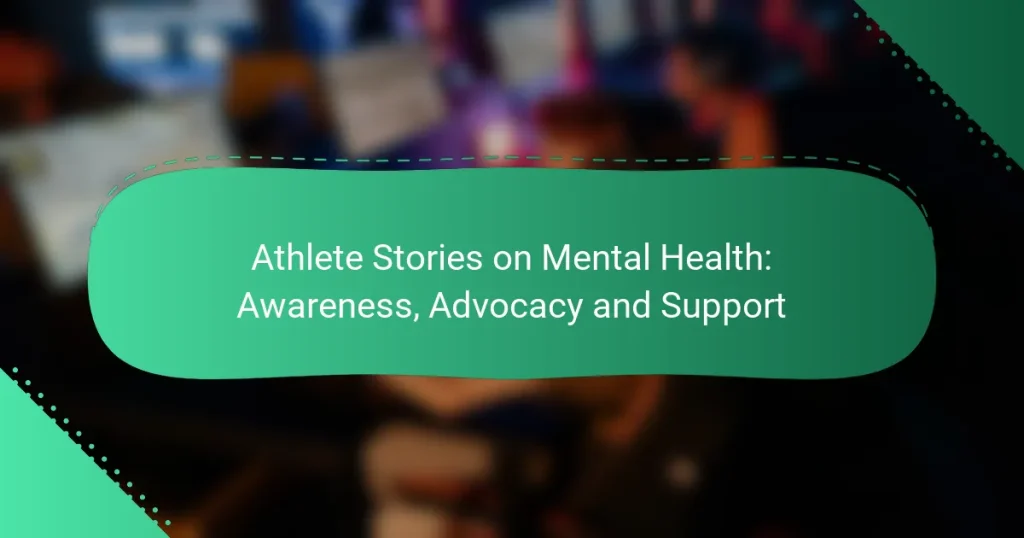Athletes play a crucial role in raising awareness about mental health, using their visibility to educate the public and share personal experiences. By advocating for mental health resources, they help reduce stigma and create a supportive environment for those facing challenges. Their stories not only inspire others to seek help but also foster a deeper understanding of mental health issues within the sports community and beyond.
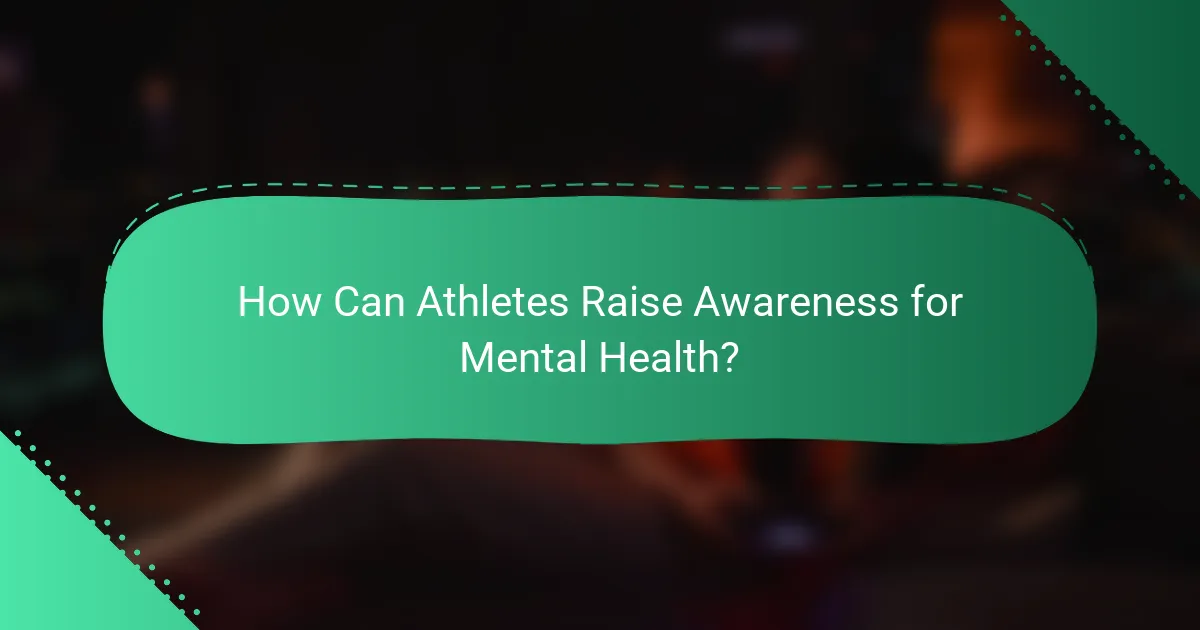
How Can Athletes Raise Awareness for Mental Health?
Athletes can raise awareness for mental health by leveraging their influence and visibility to educate the public, share personal experiences, and advocate for mental health resources. Their platform allows them to reach diverse audiences, making a significant impact on reducing stigma and promoting support.
Social media campaigns
Social media is a powerful tool for athletes to raise mental health awareness. By sharing personal stories, informative content, and engaging with followers, athletes can create a supportive online community. Campaigns can include hashtags, challenges, or partnerships with mental health organizations to amplify their message.
For example, an athlete might share a video discussing their mental health journey, encouraging followers to seek help if needed. Regular posts that highlight mental health resources can also foster ongoing dialogue and support among fans.
Public speaking engagements
Public speaking engagements allow athletes to connect with audiences on a personal level while discussing mental health topics. They can participate in panels, workshops, or school visits to share their experiences and insights. This face-to-face interaction can inspire others to open up about their struggles.
When preparing for these engagements, athletes should focus on authenticity and relatability. Sharing both challenges and coping strategies can resonate deeply with listeners, making the conversation more impactful.
Collaborations with mental health organizations
Collaborating with mental health organizations can enhance an athlete’s advocacy efforts. These partnerships can provide resources, expertise, and credibility, helping to reach a wider audience. Joint initiatives may include fundraising events, awareness campaigns, or educational programs.
For instance, an athlete might work with a local mental health charity to host a community event, raising funds while promoting mental wellness. Such collaborations not only benefit the organizations but also strengthen the athlete’s commitment to the cause.
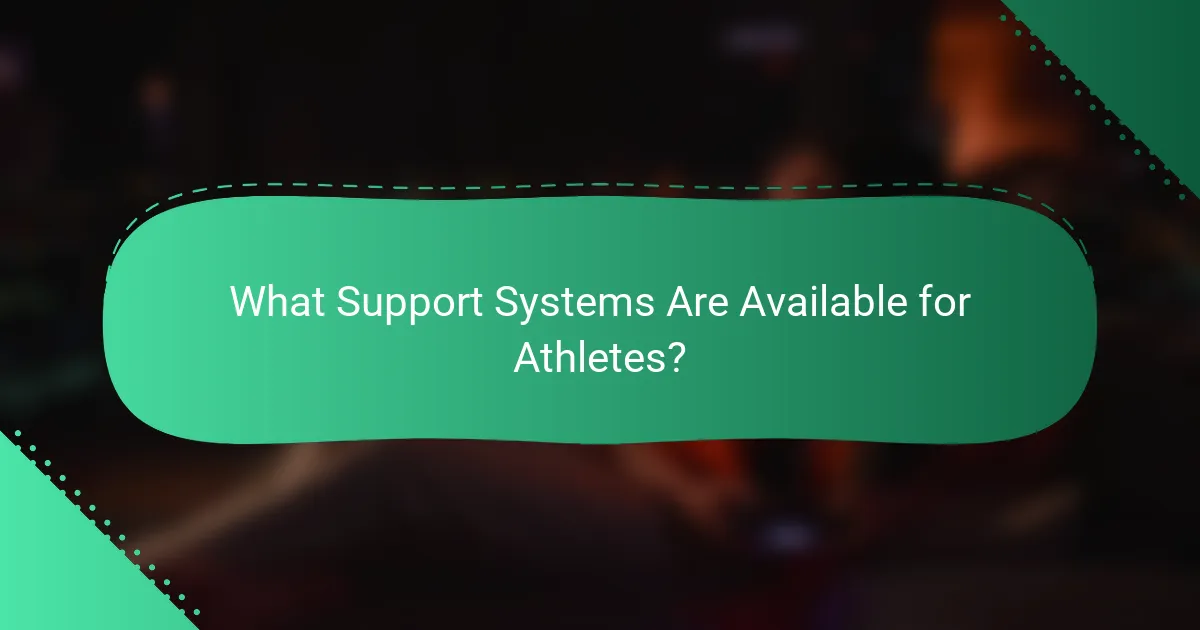
What Support Systems Are Available for Athletes?
Athletes have access to various support systems designed to address mental health challenges. These systems include peer support groups, professional counseling services, and online mental health platforms, each offering unique benefits and resources.
Peer support groups
Peer support groups provide a safe space for athletes to share experiences and challenges related to mental health. These groups often consist of individuals who understand the pressures of competitive sports, fostering a sense of community and belonging.
Participation in peer support can enhance emotional resilience and reduce feelings of isolation. Athletes can connect with others facing similar issues, which can lead to valuable insights and coping strategies.
Professional counseling services
Professional counseling services offer athletes access to licensed mental health professionals who specialize in sports psychology. These services can include one-on-one therapy, group sessions, and workshops focused on mental wellness.
When seeking counseling, athletes should consider factors such as the counselor’s experience with sports-related issues and their approach to therapy. Many insurance plans cover mental health services, making it a viable option for athletes seeking support.
Online mental health platforms
Online mental health platforms provide convenient access to mental health resources, including therapy sessions, self-help tools, and educational content. These platforms often feature licensed professionals who can offer support via video calls or messaging.
Using online platforms can be particularly beneficial for athletes with busy schedules or those who prefer anonymity. Many platforms offer flexible pricing options, including subscription models or pay-per-session, making mental health support more accessible.
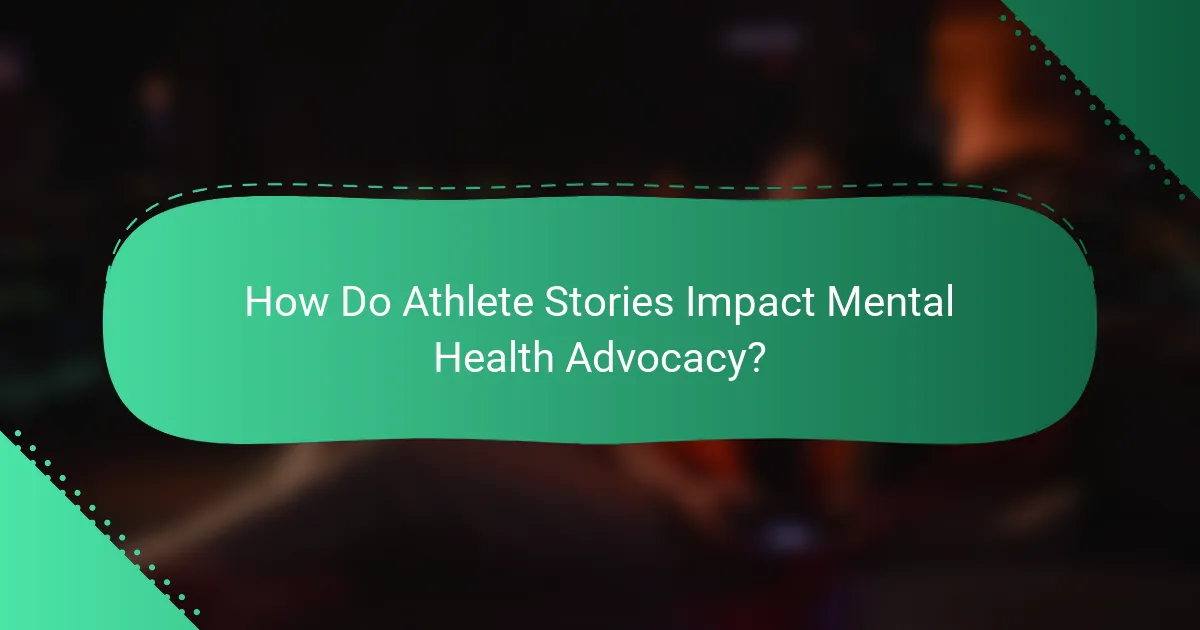
How Do Athlete Stories Impact Mental Health Advocacy?
Athlete stories significantly influence mental health advocacy by raising awareness and fostering a supportive environment. These narratives can motivate individuals to seek help and promote understanding of mental health challenges within sports and beyond.
Personal narratives inspire others
When athletes share their personal experiences with mental health, they often resonate with fans and fellow athletes alike. These stories can empower others facing similar struggles, illustrating that they are not alone and that recovery is possible.
For example, a professional athlete discussing their battle with anxiety can encourage young athletes to address their own mental health issues openly. This connection can create a ripple effect, inspiring others to share their stories and seek support.
Increased visibility of mental health issues
Athletes bring significant media attention to mental health issues, making them more visible to the public. This visibility helps to destigmatize mental health challenges, allowing for broader conversations about their impact on performance and well-being.
High-profile cases, such as athletes stepping back from competition to prioritize their mental health, highlight the importance of mental wellness in sports. This can lead to increased funding and resources dedicated to mental health programs within athletic organizations.
Encouragement of open discussions
By sharing their struggles, athletes encourage open discussions about mental health in various settings, including schools, sports teams, and communities. These conversations can help normalize mental health topics, making it easier for individuals to seek help without fear of judgment.
Creating safe spaces for dialogue, such as workshops or forums led by athletes, can foster a culture of support and understanding. This proactive approach can significantly reduce the stigma surrounding mental health issues and promote overall well-being in athletic environments.
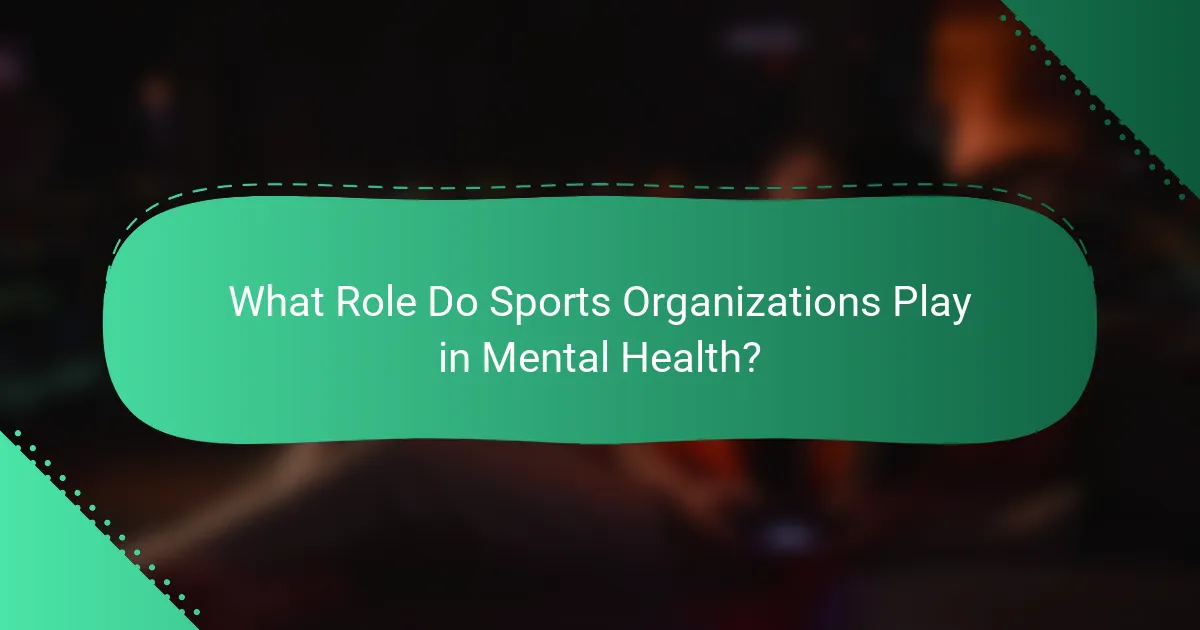
What Role Do Sports Organizations Play in Mental Health?
Sports organizations play a crucial role in promoting mental health awareness and support among athletes. They implement programs, provide resources, and create environments that encourage open discussions about mental well-being.
Implementing mental health programs
Sports organizations are increasingly developing mental health programs tailored to the needs of athletes. These programs often include workshops, counseling services, and training for coaches to recognize mental health issues. By integrating mental health education into their structures, organizations can foster a culture of support.
For example, some organizations may partner with mental health professionals to offer regular seminars or training sessions. This proactive approach helps athletes understand the importance of mental health and equips them with coping strategies.
Providing resources for athletes
Access to mental health resources is essential for athletes facing challenges. Sports organizations can provide resources such as hotlines, online support groups, and access to licensed therapists. These resources should be easily accessible and confidential to encourage athletes to seek help without fear of stigma.
Additionally, organizations can create informational materials that outline signs of mental health issues and available support options. This empowers athletes to recognize their own needs and seek assistance when necessary.
Creating safe environments for discussions
Creating a safe environment for discussions about mental health is vital for athletes to feel comfortable sharing their experiences. Sports organizations should promote open dialogue by normalizing conversations around mental health and ensuring that athletes know their concerns will be taken seriously.
Regular team meetings or check-ins can be effective in fostering this environment. Encouraging athletes to share their thoughts and feelings can help reduce stigma and build a supportive community. Training staff to respond empathetically can further enhance these discussions.
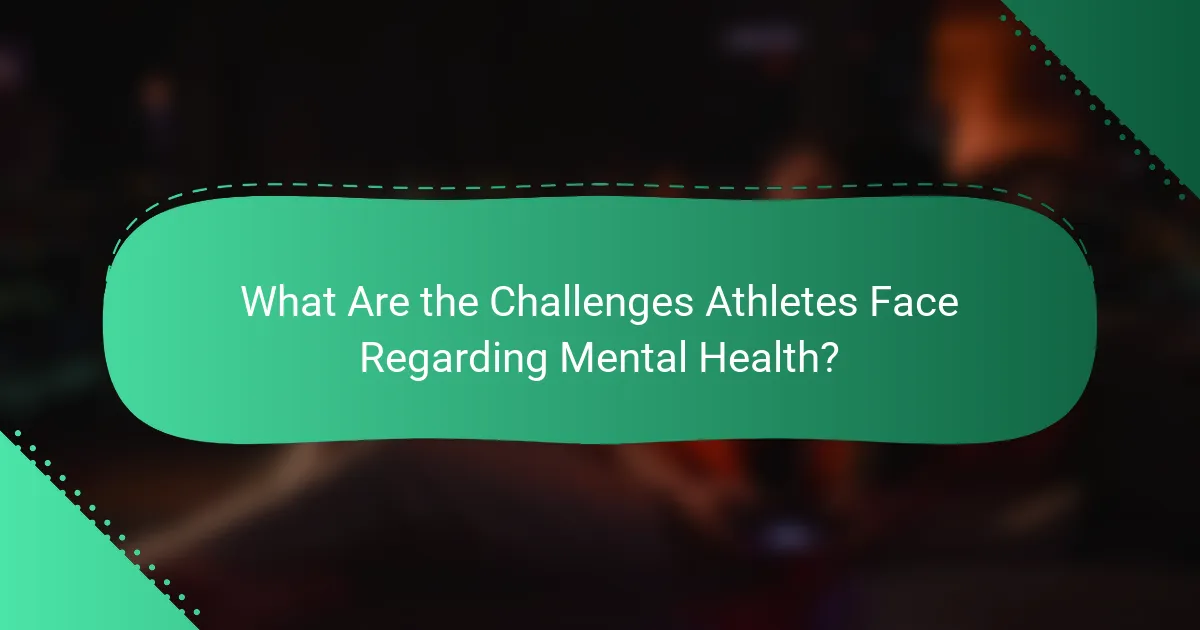
What Are the Challenges Athletes Face Regarding Mental Health?
Athletes face numerous challenges regarding mental health, including societal stigma, intense performance pressure, and limited access to mental health resources. These factors can significantly impact their well-being and performance, making it essential to address them effectively.
Stigma and misconceptions
Stigma surrounding mental health often prevents athletes from seeking help. Many believe that admitting to mental health struggles may be perceived as a weakness, leading to fears of judgment from peers, coaches, and fans.
Misconceptions about mental health can further complicate matters. For instance, some may think that athletes should be immune to mental health issues due to their physical prowess, which is far from the truth.
Pressure to perform
The pressure to perform at high levels can take a toll on an athlete’s mental health. This pressure often comes from various sources, including coaches, sponsors, and fans, creating an environment where athletes feel they must constantly excel.
High expectations can lead to anxiety and burnout. Athletes may struggle to balance their mental health with the demands of training and competition, which can exacerbate existing issues.
Lack of access to resources
Access to mental health resources is often limited for athletes, particularly in less developed regions. Many sports organizations do not provide adequate mental health support, leaving athletes to navigate their challenges alone.
Even when resources are available, athletes may not know how to access them or may feel uncomfortable seeking help. This lack of awareness can prevent them from receiving the support they need to maintain their mental well-being.
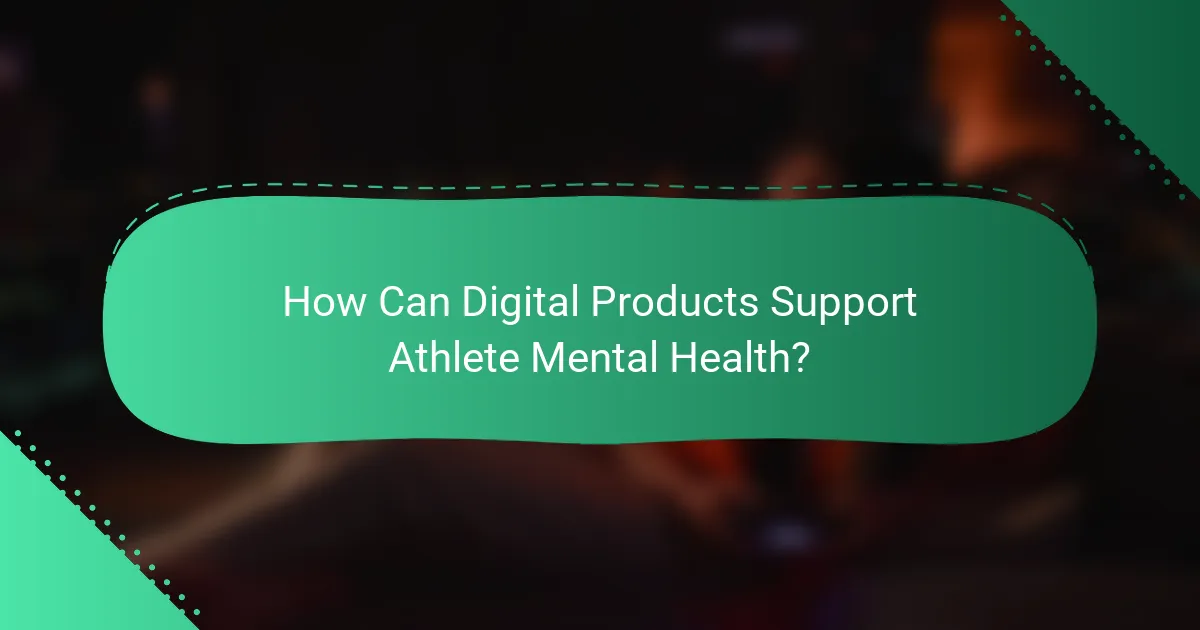
How Can Digital Products Support Athlete Mental Health?
Digital products can significantly enhance athlete mental health by providing accessible tools for self-care, therapy, and community support. These resources help athletes manage stress, anxiety, and other mental health challenges effectively.
Mental health apps for athletes
Mental health apps tailored for athletes offer features like mood tracking, guided meditations, and cognitive behavioral therapy exercises. These tools can help athletes identify stressors and develop coping strategies in real-time.
Popular apps include Headspace, which provides mindfulness exercises, and MyFitnessPal, which includes mental wellness features. When choosing an app, consider user reviews, ease of use, and whether it aligns with specific mental health goals.
Online therapy platforms
Online therapy platforms connect athletes with licensed mental health professionals through video calls, messaging, or chat. This flexibility allows athletes to seek help from the comfort of their homes, making it easier to fit therapy into busy schedules.
Platforms like BetterHelp and Talkspace offer a range of therapists specializing in sports psychology. When selecting a platform, check for credentials, available specialties, and pricing options, as some may accept insurance while others operate on a subscription model.
